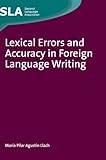Lexical errors and accuracy in foreign language writing / [Book] / MarÃa Pilar AgustÃn Llach.
Material type: TextSeries: Second language acquisition (Clevedon, England)Publication details: Bristol : Multilingual Matters, 2011.Description: xiii, 247 pages. : illustrations ; 21 cmContent type:
TextSeries: Second language acquisition (Clevedon, England)Publication details: Bristol : Multilingual Matters, 2011.Description: xiii, 247 pages. : illustrations ; 21 cmContent type: - text
- unmediated
- volume
- 9781847694171 (hardback) :
- 1847694179 (hardback) :
- 9781847694164 (paperback) :
- 1847694160 (paperback) :
- 401.93 22
- 401.93
| Item type | Current library | Call number | Status | Date due | Barcode | Item holds |
|---|---|---|---|---|---|---|
 Books
Books
|
Junaid Zaidi Library, COMSATS University Islamabad | 401.93 AGU-L (Browse shelf(Opens below)) | Available | 53530 |
Includes bibliographical references.
Lexical errors are a determinant in gaining insight into vocabulary acquisition, vocabulary use and writing quality assessment. Lexical errors are very frequent in the written production of young EFL learners, but they decrease as learners gain proficiency. Misspellings are the most common category, but formal errors give way to semantic-based lexical errors as proficiency increases, likewise, the direct influence of the L1 also reduces in favour of more elaborated transfer mechanisms and L2 influence. The different categories of lexical errors indicate the stage of learning. This book uses a study of young EFL learners to suggest that lexical accuracy is a crucial component of writing assessment, and that lexical errors are useful in predicting writing quality.
All.


There are no comments on this title.